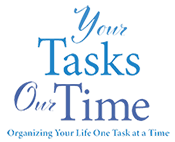 For those who have ADHD and struggle to get organized, it does not have to be an impossible feat. We will outline some tips and recommendations so you can create a strategy for regaining focus and motivation in your daily life.
For those who have ADHD and struggle to get organized, it does not have to be an impossible feat. We will outline some tips and recommendations so you can create a strategy for regaining focus and motivation in your daily life.
Let’s put one myth to rest. Being organized is not about perfection. No one’s home is perfect every minute of the day. Being organized is about putting a simple system into place that will work for you and your family and can be maintained on a consistent basis.
So how does one put a simple system into place that will balance the need for organization with ADHD? First, think about which areas of your life need simplifying. Is it your schedule, your paperwork, your home, or all of them? Then identify ways you can make small changes that will have a big impact on you every day.
Many with ADHD have difficulty focusing on a given task for too long. We recommend starting with small chunks of time to accomplish tasks. For example, set aside 30 minutes to tackle a task. If 30 minutes leaves you feeling overwhelmed or frustrated, then allot 15 minutes for the next task. Once you complete a task, take a short break (10-15 minutes) before you move on to the
next task. Apps like Time Timer can help track your time spent. The key is to work in short bursts to stay alert. Begin with the easiest tasks first and work your way up to the more complicated ones. Be sure to accomplish these tasks during your most productive time of the day for you.
For the larger or more complex projects, we recommend they be broken down into smaller tasks. For example, you want to organize your home office, but you know it will take hours. Break it down into 30-minute tasks. One task could be purging and organizing the items on the desktop. Another task could be organizing 1-2 drawers. Another could be culling the books on the bookshelves. By tackling one task at a time, the overall project becomes more achievable.
Now that we have talked about strategies for how to approach tasks, let’s discuss ideas that may help maintain attentiveness.
Schedule
All the appointments, calls, and errands we need to complete can be dizzying. It can be easy to lose focus if we don’t know what we want to accomplish each day. The best way to organize your schedule is to set goals and allot time to achieve those goals.
- To Do Lists – Daily lists help set your goals for the day. Keep your daily list short. No more than 5 items per day so the focus is on your top priorities. If you have more tasks than that, add the remaining items to a weekly or monthly list.
- Calendars – Use a calendar or planner to organize your day. For our tech savvy friends, use the calendar feature on your phone or device. Block out time on your schedule to complete each item on your Daily To-Do List. Don’t forget to create reminders so you don’t miss tasks or appointments!
- Tickler Files – Let you keep track of time-sensitive documents that need action but at a future date. Use these in coordination with your To Do Lists and calendars.
We recommend creating your Daily To-Do List the night before and block out time on your calendar so you can hit the ground running in the morning.
Paperwork
Many people are bogged down by the sheer volume of papers that come into their home. To cut down on the amount of paper so you can focus on more important things, consider these ideas:
- Purge your mail right away. Toss out junk mail immediately and only keep important items.
- Switch to online banking. No more statements to file, checks to write out, or forgetting to run to the post office.
- Request paperless bills. Mark down reminders on your calendar for when the bills are due.
- For those hard copy files that you must save … Keep your filing system simple. Use broad categories for your folders and only create subcategories when it is necessary.
Home
Your physical space can contribute to a lack of concentration. Set yourself up for success by considering these pointers:
- Simplify your wardrobe. Paring down to essential items can reduce the time and anxiety to get dressed every day.
- Purge excess possessions. The more items you must contend with daily, the more distraction you must overcome to gain focus. Keep the items you need and use but let go of the items that don’t bring value to your life.
- Use a landing zone for the important things that you need as you head out the door each day. Your keys, glasses, backpack, etc. should be in a place that you can quickly grab without thought.
And remember, you don’t have to go through this alone. Reach out for support if you need it. It can be a family member, friend, mentor, professional organizer, medical professional or life coach. There are so many resources out there to guide you, support you and partner with you to help achieve your goals.
Darla Pompilio
Your Tasks – Our Time, LLC


